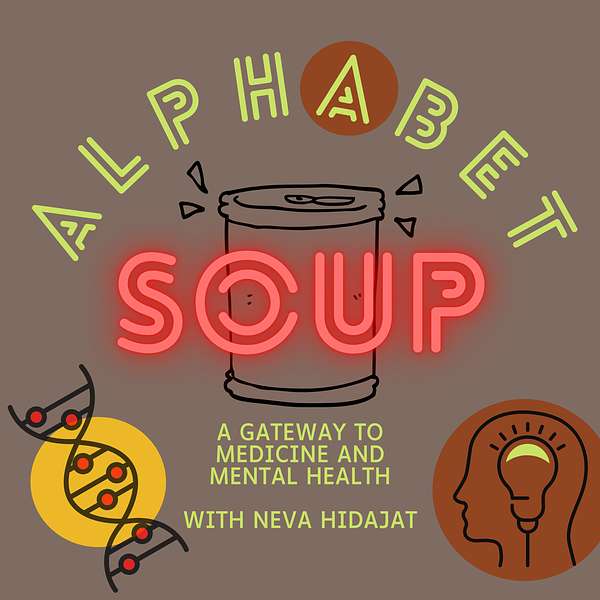
Alphabet Soup: A Mental Health & Medicine Podcast
Alphabet Soup: A Mental Health & Medicine Podcast
Ep. 23 Spooky Syndromes
Use Left/Right to seek, Home/End to jump to start or end. Hold shift to jump forward or backward.
Neva talks about 5 spooky, but real medical conditions including Alien Hand Syndrome, sleep paralysis, Porphyria, hypertrichosis and exploding head syndrome.
Hey guys welcome back to Alphabet Soup! I hope you all had a great Halloween. Have you ever heard of Alien Hand Syndrome or Exploding Head Syndrome? Believe it or not these conditions are real! Today’s episode highlights 5, real-life, spooky syndromes so keep listening to find out more about them!
The first syndrome we’re going to talk about is Alien Hand Syndrome, which is basically a phenomenon in which the mind’s ability to control a hand is disrupted. This syndrome sometimes appears amongst patients who have experienced stroke, trauma or tumors. What happens, is the hand seems to move deliberately to carry out tasks that are unintentional, and the patient experiences the sensation that their arm is foreign to their body. Some treatment options for people with alien hand syndrome include mirror box therapy, where mirrors are used to create the illusion that the affected arm is moving along with the normal arm.
The next syndrome is called porphyria, also known by its nickname, “Vampire disease” because people with this condition face symptoms after being exposed to sunlight. It is caused by a certain liver enzyme and the presence of more liver iron than normal. Symptoms include blisters after sun exposure, extreme photosensitivity, redness and swelling of the skin. Interestingly enough, medical myths share how people with porphyria would have red urine which suggested that they drank their own blood. Furthermore, some physicians had recommended drinking their own blood to cure their symptoms. Vampire stories like Dracula have evolved from record of this condition.
The third syndrome I’ll talk about is called exploding head syndrome, which is a type of sleep disorder. No, a person’s head doesn’t literally explode, but it can definitely shock them. People with this syndrome often experience an ear-splitting noise or a flash of light when transitioning from sleep to wakefulness. While there isn’t any physical pain accompanied with the symptoms, patients often feel shocked and therefore the condition can cause a lot of distress. Treatment for exploding head syndrome can be taking prescribed antidepressants or seeing a therapist.
Hypertrichosis, but for our purposes werewolf syndrome, is a condition that is characterized by excessive hair growth anywhere on a person’s body. The causes of this condition are not well understood but are most likely due to a genetic error in the gene that codes for hair follicle development. Another hypothesis is that the conditions is caused by a genetic reactivation of genes that used to cause excessive hair growth in early humans. Treatment for the condition include temporary hair removal, however no known solutions are permanent.
Finally, is sleep paralysis, which is characterized by the feeling of being conscious but unable to move. Other symptoms include feeling immense pressure or being choked. Like exploding head syndrome, sleep paralysis occurs during the phases between sleep and wakefulness. Phases of sleep paralysis may last as short as a few seconds to a few minutes, which can feel like forever. Sleep deprivation is a major cause of sleep paralysis because it leads to REM sleep irregularity. This is linked to paralysis because it is during REM sleep that our bodies are paralyzed. Which is a good thing because it prevents us from acting our dreams out. Those who face problems regulating REM sleep can therefore experience sleep paralysis.
Ok, for today’s bit here’s a Halloween joke: Why do skeletons have such low self-esteem? Because they have no body to love. Get it? They have no BODY to love! Ok but on another note, wellbeing is an important part of this podcast so if you are dealing with low self-esteem please try to reach out to someone you can trust about it so that they can help you build your confidence up.
I hope you guys found it interesting to learn about some new spooky syndromes! As always, feel free to share the show with your family and friends and I’ll be back next week with a new episode.